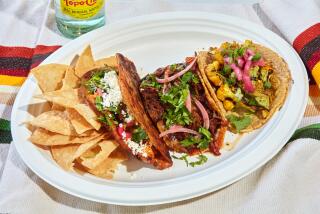Miami’s Bayside Marketplace Is All About Eating
- Share via
MIAMI — There are plenty of things to do and buy at the Bayside Marketplace, Miami’s new downtown tourist attraction, but what this waterfront attraction is really about is eating.
More than a million visitors--as many natives as tourists--came down to the edge of Biscayne Bay to sample the fare in April when Bayside opened, and few were disappointed.
The $93-million, 235,000-square-foot project was designed by Rouse Co., the Maryland-based company that developed Harbor Place in Baltimore, Quincy Market in Boston and South Street Seaport in Manhattan.
The two bilevel pavilions, laid out on and around an old pier and marina, have the feel of an ocean liner, featuring dozens of restaurants, including elegant sit-down facilities, pushcarts and more numerous stand-up eateries lining wide aisles.
Developers have taken great care that this airy, sky-lit smorgasbord reflects the ethnic and cultural diversity of the Miami area: corned beef and bagels, Creole and soul food, Cuban and Caribbean cuisine, pizza and Chinese food.
Place for Grazing
While some prefer to graze, our party of five, four adults and one child, split up at lunchtime to forage according to our individual tastes in The Food Hall on the second floor of the South Pavilion, where there is seating for about 1,000.
We arranged to rendezvous at an outdoor patio overlooking the former Miamarina to sample each other’s fare. One of the more interesting things to do while munching is to watch the work of the Aquadozer, which cruises the quiet waters of the marina picking up floating litter.
This is the same 208-slip facility where “Miami Vice’s” Sonny Crockett docks his boat, guarded by his pet alligator Elvis. During World War II this section of Bayfront Park was a base for PT boats. In the 1500s a Jesuit Mission was not far away, where the Miami River empties into the bay.
For psychological reasons--i.e., convincing yourself that the exercise will dilute the impact--dessert is probably best sampled while walking. You have many choices, including uncounted flavors of ice cream and a straight sugar fix from the Fudgery’s sing-along candy makers.
The 4-year-old in our party was further engaged by a tour of the H.M.S Bounty, the replica from MGM’s 1962 version of “Mutiny on the Bounty” with Marlon Brando, now owned by Turner Broadcasting and berthed at the end of the South Pavilion.
For adults, nonstop music and dance groups perform on stages, and areas reflect South Florida’s diversity as does the food. You may also shop for colorful clothing and crafts of the region.
Bayside Marketplace has several purposes. Boosters hope that it will be a place that will draw South Florida tourists, especially the burgeoning cruise trade, to the downtown area for an afternoon or evening. But by making the eating menu so diverse, backers also want Bayside to be a place that natives will bring visitors to, rather than simply sending them on their own.
And last, but not least, they want the development to draw Miamians who work downtown to Bayside at mealtimes during the week and to keep them in the city in the evenings, after visits to a nearby fine arts complex.
To realize these goals, the developers recognized that the major concern of tourists and natives in any urban center is security and access.
Security is much in evidence, in the persons of Metro Dade County and private security officers, in uniform and plainclothes. For locals, Bayside is conveniently at the terminus of Miami’s Metrorail and Metromover--its innovative “People Mover.” In addition, free or low-cost shuttles serve nearby hotels and shopping centers, and there’s plenty of parking for cars and docking space for boats.
Miami has much to commend itself--the Art Deco district of South Miami Beach, the Cuban flavor of Calle Ocho and a bustling port--but until now it has had no vibrant city center. To this end, the city has committed itself to refurbishing 100-acre Bayfront Park, which would connect Bayside to a new downtown hotel cluster.
“We know why we think downtown is important,” wrote a newspaper columnist about the city’s hopes for Bayside. “A city without a downtown is Orange County, Calif. But we know, too, that downtown Miami is a bad joke to a lot of people. Well, the joke could be over.”
More to Read
Sign up for The Wild
We’ll help you find the best places to hike, bike and run, as well as the perfect silent spots for meditation and yoga.
You may occasionally receive promotional content from the Los Angeles Times.






